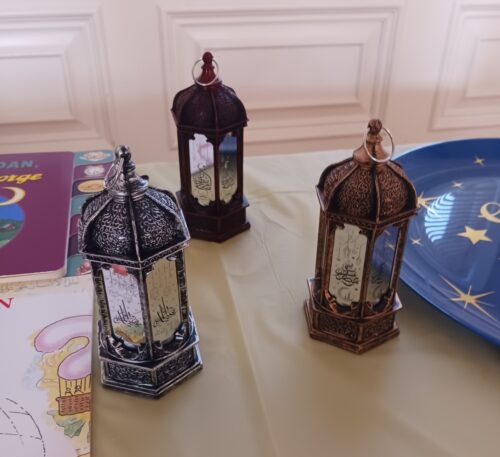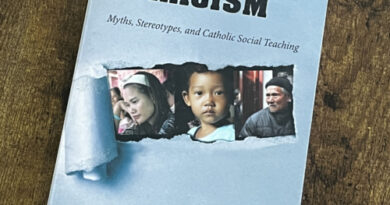“Ramadan: Through the Lens of Faith, Culture, and Anti-Muslim Politics” Educates USJ Students About Muslim Faith and Ramadan
Written by Nadia Krill
On March 21, Faith and Service held a panel called “Ramadan: Through the Lens of Faith, Culture, and Anti-Muslim Politics.” The event took place in the Crystal room in Mercy hall. Next to the speaker table was another table with different Items related to Ramadan. There were children’s books, games, decorations, and even dates for attendees to try. During Ramadan, Muslims break their fasts with an odd number of dates.
The first speaker was Dr. Reza Mansoor, a Cardiologist at Hartford Hospital. Dr. Mansoor began the event by discussing the key beliefs of Islam. First, he pointed out that Muslims believe in one God, the angels, all of the holy scriptures in their original form, and the messengers. He pointed out that Islam is one of the Abrahamic religions, as well as Christianity and Judaism. Additionally, Dr. Mansoor explained the five pillars of Islam. The first one is that there is only one God and Muhammad is the messenger. The second pillar is prayer five times a day, once before the sunrise, at noon, in the early afternoon, at sunset, and in the late night. The third pillar is fasting during the ninth lunar month, also known as Ramadan. Fasting is important for building a stronger connection with God and showing gratitude. During Ramadan, Muslims abstain from eating or drinking from dawn – before their first prayer – to sunset. There are exceptions for people who are unable to fast, where they can make up the fast during the year if they can. The fourth pillar is that everyone has to give away 2.5% of their income to the poor. It is important for the purification of a person. The last pillar is that followers need to make a pilgrimage to Mecca once in their life to celebrate the life of Abraham.
After Dr. Mansoor spoke about the fundamental beliefs of Islam, Ghoufran Allababidi spoke about her experience as a child practicing Ramadan in Syria, and how it impacted how she celebrates it in the United States. Allababidi is Syrian American and an active member of the Islamic Association of Greater Hartford. She described how Ramadan was an important part of her childhood. When she was a child, she would join chants celebrating the arrival of Ramadan a few weeks before it began. During the month, families would share food and traditions. She spoke about how Ramadan is difficult as a child because it requires you to stop bad behaviors like lying, gossiping, and arguing. However, it was also seen as an opportunity for change and reflection. Allabadidi told a story about how during Ramadan in Syria, a man would walk down the streets with a drum to wake people up for morning prayer. He would remind people to remember God and rise from their beds. When she moved to the United States, she lost a lot of the community that she had in Syria. She started to carry on the traditions of her childhood here because she wanted her children to have the same happy memories of Ramadan that she has.
The next speaker was Linda Miller who is also an active member of the Islamic Association of Greater Hartford. Her father converted to Islam when she was a child, but her family never practiced all of the traditions fully. They would fast randomly but not necessarily during Ramadan. Once she was an adult, she decided to start celebrating Ramadan with her family. One aspect of celebration is Iftar which is a fast-breaking meal. Miller attended international Iftars at her mosque in which each dinner would focus on the cuisine of a certain culture. She finished by explaining that she looks forward to Ramadan because it is a time of renewal.
After the discussion of Ramadan and it’s traditions, the panel shifted to talking about anti-Muslim politics. Dr. Mansoor began by mentioning how the media spreads misinformation about Islam. An example was Sharia, a piece of religious text that is part of Islamic tradition. He reported that in the United States, politicians would often say they were against Sharia law even though there is no such thing as Sharia law. It is not an actual law but is instead a set of beliefs that are used to guide a believer’s way of life. It is six principles: the right to protect your life, the right to protect your wealth, the right to protect your property, the right to protect your family, the freedom to practice religion, the right to education, and the right to human dignity. However, news sources portray it in a different light which fuels anti-Muslim rhetoric.
The forth panelist – Dr Kenneth Long, who is a political science professor at University of Saint Joseph – spoke about how the world is very anti-Muslim. Additionally, Dr. Long highlighted that the language people use to describe discrimination and aggression towards Muslims, Islamophobia, is misleading. Phobia is the fear of something, however, saying that people are afraid of Islam is not accurate. He suggested that people need to change the language they use to represent the discrimination properly. Additionally, Dr.Long mentioned how animosity between majority Muslim nations and the United States began long before 9/11. Colonization and the United States’ exploitation of Muslim nations contributed to the strained relationships. The panel discussed the need for more education about Islam in order to stop the hate directed at Muslim communities.
It is important that the University of Saint Joseph has events that focus on education and counteracting prejudice in the community. Events such as “Ramadan: Through the Lens of Faith, Culture, and Anti-Muslim Politics” help expose USJ’s students to cultures and traditions that they may be unfamiliar with. This exposure helps our students to better understand the people around them and promotes an environment of inclusivity and unity.
Featured Photograph: Nadia Krill





Hey Nadia
USJ Office of Faith and Service called
I loved reading this article about the panel discussion held by USJ Office of Faith and Service called “Ramadan: Through the Lens of Faith, Culture, and Anti-Muslim Politics.”. First of all, you did a fantastic job summarizing the event. I feel as though I have gotten more knowledge from your feature than if I were to physically attend this panel discussion. I am so grateful that we have a news bulletin to record and give detailed descriptions about events that happen around campus.
While I was scrolling through different articles you guys have in the website ‘Ramadan’ caught my eyes. I grew up in a place(Kerala) that celebrates all religions regardless of their difference. But we were never really educated on the roots and beliefs of those different religions. So I grew up celebrating islamic festivities with my friends but never really knew what exactly those were in place for. And I think Dr.Mansoor from the panel was right when he mentioned about not educating ourselves with the roots and different teachings in islamic faith. Every religion has its ups and downs in terms of their history, beliefs and actions. That doesn’t give us the right to look at the most horrible part of a religion and generalize it to the whole community. Even under the umbrella of Christianity we have different variants of beliefs, set of rules and regulations. That doesn’t mean one group is any less than another and vice versa. Just like that there are different communities under the umbrella of Islam which includes Shiites, Sunnis, Salafi, Sufi and etc… they might have different ways of executing certain laws and regulations. WE CAN NOT GENERALIZE AND JUDGE!! It is so wrong to do that. I think what we can do as a university is to start building our knowledge towards different religions by taking courses and classes that talk about these religions. Our university can help support this by offering the different religions multiple times throughout the semester. Upon my research in the course catalog, I found out that we have a lot of interesting religious study classes, but aren’t offered as often as certain religion classes. For the following semester in the fall 2024, eleven religion courses are offered to us. Most of them or almost all of them focus on christianity, christian sacraments, christian morality, etc… We need to bring the course catalog to life. I would love for RELS 207, 215, 240, 241 and 263 to be offered to us more often. In order to educate ourselves of our environment we need to explore outside of our comfort zone. This small step towards making our campus and students more knowledgeable towards different religions can go a long way. It can help us find our place in this world and give us a better understanding about religion through different lenses. Even though we are a college that is based on Catholic core values we can offer a safe space for students to find their callings through these different courses. It will be a great way to add inclusivity and diversity to the campus.
Personally, I like to examine and question everything before bringing myself into terms with anything. So offering other courses that lets you see religion through different lenses will be of great interest. It lets me have a much clear path towards myself, my religious beliefs and my choices in life. And I feel as though it will be an amazing opportunity for other students like me to find their calling in life. I am looking forward to my journey here at USJ with religious studies and everything life has to offer.
Overall, I loved reading the article and wished I was there to attend the event.